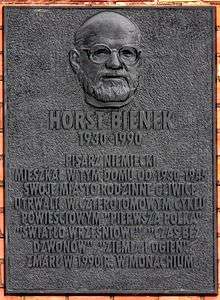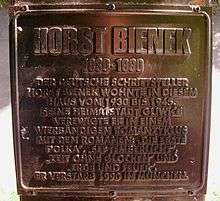Horst Bienek


Horst Bienek (May 7, 1930, Gleiwitz – December 7, 1990, Munich) was a German novelist and poet.
Born in Gleiwitz, Germany (today Gliwice, Poland), Bienek was forced to leave there in 1945, when Germans were expelled from Silesia. He resettled in the eastern part of Germany. For a time, he was a student of Bertolt Brecht. In 1951, he was arrested by NKVD and sentenced in a show trial to 25 years of labour for "anti-Soviet incitement" and alleged espionage on behalf of the United States, and sent to a Gulag concentration camp in Vorkuta. When he was released as the result of an amnesty in 1955, he settled in West Germany.[1]
Bienek was the winner of numerous prizes, including the Nelly Sachs Prize in 1981. His best-known work is the four-volume series of novels dealing with the prelude to World War II and the war itself, Gleiwitz, Eine oberschlesische Chronik in vier Romanen.
Three of his works were adapted for film:
- Die Zelle (1970)
- Die erste Polka (1979)
- Schloß Königswald (1987).
References
- ↑ Wolfgang Bittner: "Der Entwurzelte. Horst Bieneks oberschlesisches Schicksal." In: Silesia Nova. Vol. 9, No. 4, 2012, pp. 109–114.